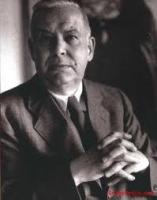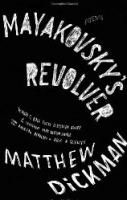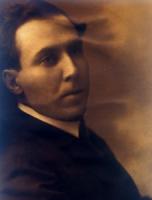October 2, 2012
Edited by David Sanders
Specimen Days
October 2, 2012
1775 – Chiyo-ni, Japanese poet (b. 1703), dies.
1879 – Wallace Stevens, Reading, PA, poet (Ideas of Order), is born.
1901 – [Ignatius] Roy [D] Campbell, South African poet (Flowering Rifle), is born.
1905 – Jose Maria de Heredia, Cuban/French sonnet poet, dies at 62.
 Valley Candle
Valley Candle
My candle burned alone in an immense valley.
Beams of the huge night converged upon it,
Until the wind blew.
The beams of the huge night
Converged upon its image,
Until the wind blew.
—Wallace Stevens (1879–1955)
Poetry In The News
Lawrence Ferlinghetti’s Indelible Image
 Lawrence Ferlinghetti was in his early 30s when he wrote a poem of hope and innocence about a penny candy store in New York and the magic to be found in jellybeans and licorice sticks, about the evanescence of a rainy September afternoon. Read more at SF Gate.
Lawrence Ferlinghetti was in his early 30s when he wrote a poem of hope and innocence about a penny candy store in New York and the magic to be found in jellybeans and licorice sticks, about the evanescence of a rainy September afternoon. Read more at SF Gate.
Rising Russian Poets with Key US Poets for a Reading and Conversation with David Lehman
Carrying forward Russia’s rich poetic tradition, acclaimed rising poets read from their work, discuss the variety and richness of contemporary Russian verse, and consider their art and its role in the context of Russia’s volatile political and social reality. Reading alongside them will be key US poets (names tba) whose work, in breadth of vision and acclaim, both relates to and differs from that of the Russian poets in interesting ways. To be moderated by David Lehman, one of the foremost editors, literary critics, poets, and anthologists of contemporary American literature. Read more at Debut Events.
World Poetry
Syrian Rebel Commander Finds Solace in Poetry
Gunter Grass, the Nobel Prize laureate in literature who is barred from entering Israel because of his anti-Israel writings and membership in the Nazi Waffen SS, launched a second poetic attack on Israel by praising atomic spy Mordechai Vanunu. Read more at the Jerusalem Post.
Teens Turn to Poetry in Record Numbers
 A record number of 11- to 17-year-olds have entered this year’s Young Poets of the Year Award. More than 7,000 young people have submitted works to this year’s contest, amid a growing consensus that poetry is cool. From rap-style onslaughts in packed-out poetry “slams” to performance artists appearing at festivals such as Glastonbury, Latitude and the Big Chill, poetry is being brought into the mainstream as never before. Read more at the Independent.
A record number of 11- to 17-year-olds have entered this year’s Young Poets of the Year Award. More than 7,000 young people have submitted works to this year’s contest, amid a growing consensus that poetry is cool. From rap-style onslaughts in packed-out poetry “slams” to performance artists appearing at festivals such as Glastonbury, Latitude and the Big Chill, poetry is being brought into the mainstream as never before. Read more at the Independent.
New Books
The Two Yvonnes: Poems by Jessica Greenbaum
[Hardcover] Princeton University Press, 80 pp., $29.95
This is the second collection from a Brooklyn poet whose work many readers will know from the New Yorker. Jessica Greenbaum’s narrative poems, in which objects and metaphor share highest honors, attempt revelation through close observation of the everyday. Written in “plain American that cats and dogs can read,” as Marianne Moore phrased it, these contemporary lyrics bring forward the challenges of Wislawa Szymborska, the reportage of Yehuda Amichai, and the formal forays of Marilyn Hacker.
Mayakovsky’s Revolver: Poems by Matthew Dickman
 [Hardcover] W. W. Norton & Company, 112 pp., $25.95
[Hardcover] W. W. Norton & Company, 112 pp., $25.95
At the center of Mayakovsky’s Revolver is the suicide of Matthew Dickman’s older brother. “Known for poems of universality of feeling, expressive lyricism of reflection, and heartrending allure” (Major Jackson), Dickman is a powerful poet whose new collection explores how to persevere in the wake of grief.
Road Scatter: Poems by Sandra Meek
[Paperback] Persea, 96 pp., $15.95
The fourth poetry collection by Sandra Meek is a kinetic exploration of breakage and survival. The poems are compelled by the decline and death of the poet’s mother and by other urgent encounters at home and abroad—in the American South, Latin American, sub-Saharan Africa, and elsewhere.
Meme by Susan Wheeler
[Paperback] University of Iowa Press, 102 pp., $18.00
Susan Wheeler reconstructs her mother’s voice—down to its cynicism and its mid twentieth-century midwestern vernacular—in “The Maud Poems,” a voice that takes a more aggressive, vituperative turn in “The Devil—or—The Introjects.” In the book’s third long sequence, a generational inheritance feeds cultural transmission in “The Split.” A set of variations on losses and break-ups—wildly, darkly funny throughout and, in places, devastatingly sad—“The Split” brings Wheeler’s lauded inventiveness, wit, and insight to the profound loss of love. One read, and the meme “Should I stay or should I go?” will be altered in your head forever.
Recent Reviews
Second Simplicity: New Poetry and Prose, 1991–2011 by Yves Bonnefoy
by Nicole Zdeb
Second Simplicity, the first compilation of Yves Bonnefoy’s work since 1995, samples from seven previous collections, representing verse and prose emblematic of the major themes of the past two decades and showcasing Bonnefoy’s range, including his experimental prose poems and a sui generis genre called “tales within dreams.” The collection is well curated, cohesive and various, and gifts English readers with indisputable pearls: many of these translations have not appeared in book form; some are printed for the first time. Read more at Quarterly Conversation.
The Unconquered Flame: On Robert Duncan
by Ange Mlinko
Ever since The Iliad and The Odyssey were ascribed to Homer, the blind poet has served as a metaphor for the ability to catch sight of things beyond mere appearance. Robert Duncan, born in 1919, belonged to this tribe of seers. At the age of 3, he slipped in the snow in Yosemite while wearing sunglasses against the glare; they shattered, and the injury resulted in strabismus—a condition in which the eyes cannot focus on the same object. Read more at The Nation.
Correspondences
“Poetry is always spoken”: An interview with TJ Dema
 by Joshua Barnes
by Joshua Barnes
“Poet TJ Dema [is] on top of the world,” says BKO, an online poetry and literary magazine that credits her as “Botswana’s most amazing poetry talent.” Currently Tjawangwa TJ Dema is in the states participating in the 46th Annual International Writing Program hosted by the University of Iowa. Read more at Sampsonia Way.
George Bacovia – The Poet of Grayness
Mariana Ganea
On an autumnal evening I found in my private library a book that could not fit better with the rainy weather outside. Into a dark and overlooked corner I came across a little old book “Poems” by George Bacovia. Instantly I remembered the wonderful high school years, when many class schoolmates thought I was a little strange because one of my favorite Romanian poets was “the gray” Bacovia. Read more at Romania Insider.
Broadsides
Good in the Good Sense: Antonio Machado
 by Stephen Akey
by Stephen Akey
When I first encountered Antonio Machado’s poetry in a Spanish literature class at the University of Connecticut, I found myself, even by my standards, more than usually baffled. Read more at Open Letters Monthly.
Developing an African Women’s Poetic Canon in French
by Liza Katz
In recent decades, women of the post-Négritude African poetic tradition have redefined the image of the woman in francophone poetry. Specifically, they have had to grapple with a tradition that casts them as the passive and voiceless objects of literature rather than the makers of it. Read more at Quarterly Conversation.
Should Power Listen to Poetry?
by Antjie Krog
In South Africa, with its history of colonialism and apartheid, each creative work makes a political point. Whether focusing on injustice or universal loneliness, here, one makes a political point. One is either part of what former Nobel prize committee member Horace Engdahl calls “the great dialogue of literature about the improvement of humanity”, or suggesting that one doesn’t particularly care for it. Read more at the Guardian.
Poetry and Gerbils
by Diane Lockward
Poet and publisher Paul Zimmer has a terrific article in the Sept / Oct issue of Poets & Writers. He covers his work as a publisher of poetry books going back to 1967. During those years he worked for three different presses: University of Pittsburgh Press, University of Georgia Press, and University of Iowa Press. He talks about the arduous process of reading manuscripts, selecting winners, and notifying poets with either good or bad news. He also mentions that during his years as a publisher he never once charged a fee. He talks about the methods he used to make such work possible, a job that must be getting increasingly difficult with the “current overpopulation of American poets”—a condition he compares to a “gerbil farm gone bananas.” Read more at Blogalicious.
Drafts & Fragments
Attainted: The Life and Afterlife of Ezra Pound in Italy
 By Luciano Mangiafico
By Luciano Mangiafico
On May 24 1945, distinguished U.S. poet Ezra Loomis Pound found himself locked in a special cell – a cage, really – in the United States Army Disciplinary Training Center in Metato, a few miles north of Pisa, Italy. The USDTC stockade, which stateside newspapers had dubbed the repository of “the dirty sediments of our troops in the Mediterranean theater” was used to incarcerate U.S. military personnel who had committed serious criminal offenses and were awaiting either court martial, transfer to a penal institution in the United States, or execution. Most prisoners were housed in tents, but those suspected of suicidal tendencies, considered a danger to others, likely to make escape attempts, or condemned to death, were housed in so-called “observation cells,” commonly known to inmates as “death cells.” Read more at Open Letters Monthly.
Philip Schultz Writes The Day In Verse
 Today at All Things Considered, we continue a project we’re calling NewsPoet. Each month, we bring in a poet to spend time in the newsroom — and at the end of the day, to compose a poem reflecting on the day’s stories. Listen at National Public Radio.
Today at All Things Considered, we continue a project we’re calling NewsPoet. Each month, we bring in a poet to spend time in the newsroom — and at the end of the day, to compose a poem reflecting on the day’s stories. Listen at National Public Radio.
The TED Talk that Got 2 Standing Ovations
by Jenn Savadge
Spoken word poet Sarah Kay performs her poem, “If I Had A Daughter,” and talks about the power of new ideas. If you have only five minutes today, use them to watch the first five minutes of this video. If you’ve got 20, watch the whole thing. In the first five minutes, spoken word poet Sarah Kay performs her poem, “If I Had A Daughter…” Trust me when I tell you that it is worth watching, and worth showing your own daughter if you have one. Watch at the Mother Nature Network.
Envoi: Editor’s Notes
Five Marks of Oft-Rejected Poems
by Michael Mlekoday
There’s a bug going around the IR office. We’re drinking plenty of fluids, popping lots of pills, but everyone’s on edge. Just yesterday, I shook hands with Fiction Editor Joe Hiland, and I think I caught it: I caught the grouchy bug. So, I think it’s time for a poetry take on Joe’s post about what we often reject. Read more at Indiana Review.
1. “In Worcester, Massachusetts,/ I went with Aunt Consuelo/ to keep her dentist’s appointment” (E. Bishop) 2. ” . . . her hands/ fly in and out of her shawl/ catching scraps of her voice,/ feathers fallen from birds.” (C. Forche) 3. “I weep like a schoolgirl” (M. Strand) 4.”Bestiary” by K. Ryan 5. “By the rusty- three-year-/Ago left-behind cookstove/ Of the old trail crew,/ Stoppt and swam and ate my lunch.” (G. Snyder).
That is completely unfair, but I couldn’t resist.
Nonetheless, the rigidity of these precepts stopped me short initially. But you know what? There’s no good reason why a magazine shouldn’t have an editorial policy regarding what it finds acceptable, what it finds repellent, or what it is really looking for. That Indiana Review chooses to announce that policy (although it doesn’t say it is policy) is to its credit. For twenty years, I administered and was the principal reader for three poetry book prizes, and was the poetry editor at two publishing houses. I never thought to announce my tastes except through the kind of books I ultimately published. My main concern when going through a manuscript was that the beginning of a poem invited me in, that the poem itself engaged me, and that the end was in the visible light range on the spectrum between anticipation on one end and surprise on the other. My criteria seem much more vague and, on some level, more subjective than those of the Indiana Review. But I didn’t know any other way to go about it. I did though also keep Philip Larkin’s criteria close at hand: “Could I read it? If I could read it, did I believe it? If I believed it, did I care about it? And if I cared about it, what was the quality of my caring, and would it last?” Those still seem like wise words.
—David Sanders